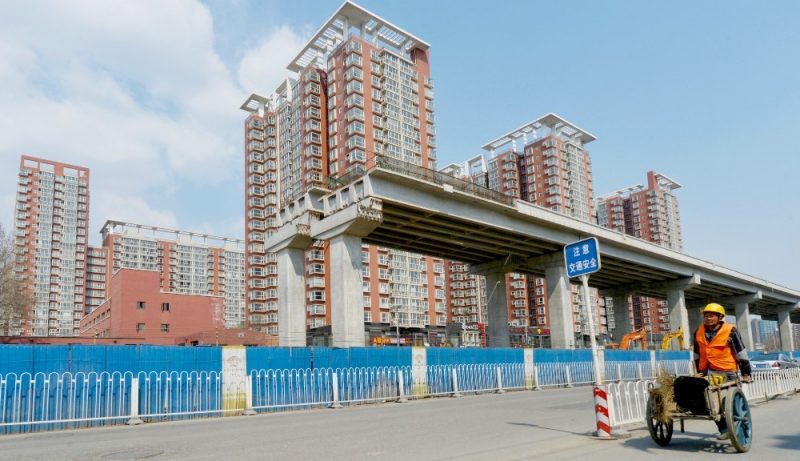To Address Its Real Estate Crisis, China Revives Socialist Ideals

The enormous real estate market in China is collapsing. Xi Jinping is keen on reinstituting communist housing policies and restoring power to the central government.
Across China, home prices are plummeting, developers are declaring bankruptcy, and many are beginning to question the long-term viability of real estate as an investment. The global catastrophe has scared off investors and slowed growth.
After years of private sector dominance, the new policy calls for the Communist Party to seize a bigger portion of the market. Recent government pronouncements and policy advisors involved in the negotiations indicate that two main programs comprise its foundation.
One option is for the government to purchase run-down private housing developments, renovate them, and then either sell or rent them out. The second one demands that the government construct additional affordable homes for middle-class and low-income households.
The policy advisors’ stated objective is to raise the current proportion of state-built low-cost rental or sale housing in China from about 5% to 30% of the country’s total housing stock.
In recent years, Xi has pushed to increase party control over the economy and limit the role of the private sector. These measures are in line with that effort. More investment in state-owned corporations in chosen industries like semiconductors and regulatory crackdowns on internet firms like Ant Group, funded by Jack Ma, are all part of that strategy.
Vice Premier He Lifeng, Xi’s chief economic adviser, and the rest of Beijing’s economic mandarins are still working out the details of the real estate strategy’s implementation. Economists warn that the plan’s implementation could be protracted, if not impossible.
Some estimates put the price tag at around $1.4 trillion over the next five years, or $280 billion annually.
A key question is whether China is willing or able to pay that bill. Already weighed down by massive debt, local governments in China face the uncertain prospect of Beijing shouldering the financial load.
Over the last several years, Beijing’s efforts to spur development and fix the housing crisis have either failed to materialize or were badly implemented, leaving experts and investors unsatisfied. According to some who have looked into the government’s plans, the approach is complicated and has conflicting goals, which could make it hard to execute completely.
‘New system’
Accelerating the creation of what officials refer to as “a new model” for the real estate sector is a top objective for 2024, according to a December confab presided over by Xi. As per the official report of the meeting, the model ought to place significant emphasis on cheap housing that is provided by the state.
Government records reveal that six million affordable housing units are initially planned to be added during the next five years.
To kickstart the approach, the People’s Bank of China has allocated 500 billion yuan, or about $70 billion, in low-interest financing to policy banks. Some of the initiatives that received funding from that source are already underway.
No one from China’s top information office, the State Council Information Office, was available to comment.
Policy experts believe that Xi is emphatic that real estate—which has long been a driving force behind China’s economic growth and accounted for about 25% of GDP—should not play such a disproportionately large role going forward.
According to Xi, the financial system became more vulnerable as a result of excessive lending for real estate speculation, which in turn widened the wealth disparity and took resources away from what he calls the “real economy”—areas like manufacturing and high-tech that he believes are vital for China to compete with the United States.
The Chinese real estate market would be returned to its origins in certain respects under Xi’s proposals. Back in Mao Zedong’s day, when the party was in charge of the economy, most Chinese citizens lived in houses that were given by their respective party units.
When policymakers began liberalizing the market in the late 1990s, they had a two-pronged plan: some would live in privately built homes, while others would get government subsidies.
China Evergrande and other private developers grew swiftly and came to dominate the market in the decades that followed. In contrast to the about 66% of American households that own their homes, over 90% of Chinese households do so now.
China became very wealthy as its ownership structure shifted to private ownership. However, Xi and other top authorities were disappointed because the country was moving too far from its communist origins, and the market’s rapid expansion caused a debt-fueled bubble, which priced out many young families from desired houses.
Economists from both inside and outside of China urged Beijing to reform the sector more forcefully after last year’s market crash, which followed a government drive to curb excessive property investment that had been going on for years.
China is home to millions of unoccupied apartments, and many of these structures are in dire need of funding.
An influential member of Xi’s inner circle, Vice Premier He contended in policy meetings that a stronger government could absorb the surplus of housing stock, stabilise falling prices, and prevent banks from collapsing under the weight of hundreds of billions of dollars’ worth of property loans should the market continue to deteriorate.
Another selling element, according to the advisers, is that it may assist achieve Xi’s often-stated “common prosperity” goal of creating a more egalitarian Chinese society by transforming more private houses into state-subsidized housing for rent or sale.
Page fourteen.
With the issuance of a decree by the central government in October, known as Document 14, the new strategy began to take shape. It proposed, over the next five years, the construction of almost six million affordable housing units in 35 cities with populations exceeding three million.
Very little information about carrying out the strategy was provided in the document. However, it did say that the government would limit who may purchase units and would make it illegal to exchange such units on the open market.
According to disclosures made by the PBOC, the central bank of China has already distributed 70% of the about $70 billion it is budgeting to three policy banks: the China Development Bank, the Export-Import Bank of China, and the Agricultural Development Bank of China.
On December 19th, the China Development Bank announced that the city of Fuzhou had been approved for a 202 million yuan line of credit, which will be used to construct an affordable housing project. The local government intends to offer the 701 housing units at subsidized costs to families with modest incomes once the project is finished, which is projected to happen in 2026.
Information from the Hunan government indicates that the bank also loaned the province of Hunan, which is located south of the Yangtze River, 10 million yuan. The purpose of the loan is to build government housing in an abandoned inner-city area.
It is not apparent how much of the budget would go toward buying up properties from private developers and putting them to new uses, and how much toward creating brand-new developments. No one from the bank or the government of Hunan was available to comment.
New regulations promising unnamed financial assistance to government-subsidized rentals were issued in early January by the central bank and the government’s leading financial regulatory agency, the National Administration of Financial Regulation. As stated in the regulations, the state’s financial support would “revitalize existing housing stock.”
Senior Official Along with Xi, he visited San Francisco last November to brief American business leaders, notably those on Wall Street, on the government’s intentions.
According to sources acquainted with the situation, during a discussion that took place on the margins of Xi’s summit with President Biden, He spoke mostly about the government-subsidized housing plan. He assured the American executives that it will assist individuals in big cities in affording housing.
In light of the fact that international investors have been selling off Chinese stocks and bonds in the past few months, some of those included in the conversation speculated that Chinese officials are worried about their perceptions of the government’s housing reaction.
Although many international bankers and investors have pushed for him to take action, he remained silent on issues like reorganizing private developers facing financial difficulties or finishing the construction of the millions of homes that Chinese citizens have paid for but never received due to developers’ financial difficulties. According to the people, his half-hour monologue was unimpressive.
If Beijing wants to restore public faith in the market, it must devise a thorough strategy to help financially troubled developers with debt restructurings and convince banks and other stakeholders to take losses. This will be a painful process, but the International Monetary Fund and other economists believe it is necessary.
While Xi is determined on bursting the housing bubble, policy advisors involved in the talks say that Beijing is still hesitant to provide direct liquidity support to developers for fear of re-inflating the bubble.
Among the several complications that arise when the government purchases properties with the intention of turning them into rental units is the question of whether it should pay the market value for them (thereby bailing out developers or homeowners who are unable to make their loan payments) or demand substantial discounts. I’m not sure what to do if the owners decide they don’t want to sell either.
Economists point out that building new inexpensive homes is easier and would also help China’s construction industry. At a time when China’s population is declining, increasing new development would just add to the supply. Over the next ten years, the International Monetary Fund predicts a basic demand reduction of over 50% for new homes.
In light of China’s current economic slump, some government officials have speculated that the government could take advantage of the situation to purchase more properties at a discount, allowing it to prioritize the conversion of existing buildings.
“Gross domestic product”
“It will represent the kind of transfer to the poor households that China urgently needs,” remarks Michael Pettis, a finance professor at Peking University, who argues that if the government substantially improves affordable housing, individuals will have more disposable income to spend on other matters. He argued, however, that it was too soon to tell how things would turn out.
The University of Hong Kong’s finance professor Zhiwu Chen had a more doubtful outlook. In an effort to bolster the sagging stock market, Beijing employs its so-called “national team” of state funds to purchase stocks, which he likened to China’s new housing plan.
Attempts like these to permanently strengthen the market have frequently fallen flat. The use of public funds to acquire foreclosed properties would be no different, he added, considering the demographic difficulties and excess of the country.
Concerns about social justice may be uncomfortably brought up by government measures, he added. During a depressed market, he argued, purchasing houses from current homeowners or developers would be the same as subsidizing owners who can sell while others cannot.
The problem of wealth distribution becomes crucial, he claimed. “Not all Chinese people own many apartments, and even fewer are prepared to sell.”
The results of previous government-backed attempts to stabilize or re-engineer the market have been inconsistent.
Zhengzhou, in central China, and Suzhou, close to Shanghai, are two of several Chinese cities that have launched housing affordability programs in recent years. These programs aim to purchase unsold properties from developers and turn them into affordable housing for low-income families, including farmers who have been forced out of their homes due to urbanization.
The cities often purchased properties at below-market prices from developers controlled by local governments or backed by the state, according to researchers from China Real Estate Information Corp.
Economists claim that while these schemes did help with housing oversupply, they also put further pressure on local budgets. No one from the cities could be reached for comment.
An additional noteworthy effort to address the housing crisis in China occurred approximately ten years ago, during the last downturn in the country’s real estate market, when a “slum clearance” program was initiated.
In that initiative, state-owned banks were given low-interest loans by the central bank. These banks lent the money to developers, who in turn bought property from municipalities and townships in order to construct more housing. So that families uprooted during slum clearance could afford to buy the new apartments on the market, those local governments subsidized their purchase.
Although the program boosted real estate demand, it also increased building, which exacerbated China’s housing surplus.
According to analysts, the current housing crisis is significantly worse than the last recession, making it considerably more difficult for the government to clean up the aftermath.










